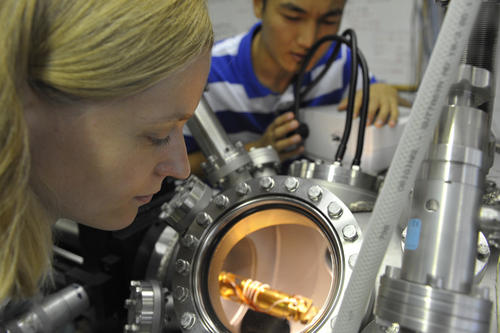Technology of the Future
Researchers involved in the NanoScale Focus Area work on joint projects in the fields of chemistry, physics, cell biology, biochemistry, and biophysics.
Image Credit: Bernd Wannenmacher
Within the NanoScale Focus Area researchers from the disciplines of biology, chemistry, pharmacy, and physics work together to investigate the special properties of nanostructures and how such structures can be used.
News from Jun 22, 2015
Nanostructures are small molecular units that researchers work with. They are the smallest units whose structure the researchers can affect. Research on nanostructures yields groundbreaking possibilities for the use of nanoscale systems in medicine and materials science, along with the fields of electronics and optoelectronics.
The researchers from the various disciplines are working together within the NanoScale Focus Area in order to gain a better understanding of the special properties of nanostructures and to develop components and systems for individualized use in a variety of applications.
The objects being investigated range from nanotubes and nanoparticles to macromolecules and beyond, to peptides and proteins. The research performed within the NanoScale network encompasses four central areas, all of which are closely interlinked: hybrid systems, nanomedicine, supramolecular interactions, and biological membranes.
Since 2009, more than 140 scientists and their teams have been working together on individual transdisciplinary projects, projects specifically aimed at supporting early career scientists, and a number of large-scale research alliances. Through their involvement in joint research projects, numerous independent research institutes in the Berlin-Brandenburg region as well as international partners are closely linked with Freie Universität Berlin.
Doctoral students benefit from joint graduate programs and collaborative projects. Among other things, the NanoScale network offers them uncomplicated access to the device infrastructure as well as valuable contacts to scientists doing application-oriented research at the partner institutions.

